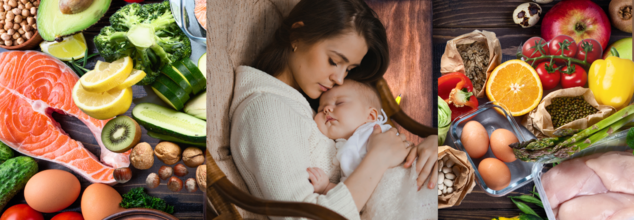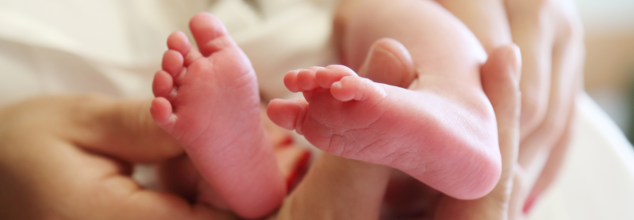- Health Conditions A-Z
- Health & Wellness
- Nutrition
- Fitness
- Health News
- Ayurveda
- Videos
- Medicine A-Z
- Parenting
- Web Stories

Postpartum Nutrition Guide: Foods Every New Mom Needs For Recovery And Lactation
Becoming a mother is a life-changing experience that goes far beyond delivery. The postpartum period, sometimes referred to as the "fourth trimester," is an important time for physical recovery and emotional adjustment. Nutrition is a critical component in this period of replenishing the body, facilitating healing, and aiding lactation. A very restrictive diet might have been allowed during pregnancy. In contrast, the postpartum diet will be more accommodating of a diversity of nourishing foods that your body and your baby need to thrive.
Having carried a baby for nine months, endured the pain of labor, and labored through delivery, your body now needs to heal. Nutrition provides the basis of energy restoration, healing tissues, and support for the production of milk in breastfeeding.
As Avni Kaul, Nutritionist, Dietician, and Wellness Coach, puts it, "This time is associated with tremendous physiological changes and psychological shifts. An appropriate diet in the postpartum period helps in healing, increases milk production, and overall health."
Benefits of a Nutrient-Rich Postpartum Diet
- Speeds Recovery: Nutrient-rich foods help in tissue repair, iron replenishment, and prevention of complications like postpartum anemia.
- Helps Produce Milk: Proper hydration and nutrition help in achieving the necessary quality milk supply.
- Boosts Wellness: Balanced diet offers energy required for a new mother's challenging role.
- Overindulgence is permissible once in a while, but it is the healthier diet that would prove best for effective recovery and lactation.
Essential Nutrients for Postpartum Recovery
1. Protein: The Basis of Recovery
Protein will assist your body to rebuild and regenerate tissues of damaged parts that need repairing in cases after delivery and in making more protein for production of the milk into the baby. Top sources are: eggs, lean meats, poultry, fish, tofu, lentils, beans, and dairy products.
2. Iron: Replace your depleted reserves
Blood loss during delivery can cause a decrease in iron levels, which may lead to weakness and a weakened immune system. Iron-rich foods with vitamin C can help restore these levels and prevent anemia.
Top sources: Spinach, red meat, liver, beans, fortified cereals, and broccoli.
Vitamin C-rich foods: Citrus fruits, bell peppers, tomatoes, and strawberries.
3. Fiber: Maintaining Digestive Health
Constipation is common postpartum due to hormonal changes and reduced physical activity. Fiber-rich foods aid digestion and prevent constipation.
Top sources: Whole grains, oats, fruits, vegetables, and legumes.
4. Hydration: The Backbone of Milk Production
Lactation and hydration depend on adequate fluid intake. Target 8-10 glasses of fluids daily, including water, herbal teas, and broths. Electrolyte-rich fluids can also balance the body after delivery.
5. Vitamin B12 and Folate: Energizing and Restoring Nerve Health
B vitamins include B12 and folate. They play an important role in energy production, nerve function, and blood cell formation. These vitamins can combat postnatal fatigue and replace the blood that has been lost in delivery.
Top sources: Eggs, dairy products, beef, fish, fortified cereals, and leafy greens such as spinach and kale.
Postpartum Superfoods for Recovery and Lactation
Some foods go beyond supporting postpartum recovery and milk supply:
- Turmeric: It is the ant-inflammatory remedy in which inflammation swelling is decreased to heal well and fast.
- Fenugreek: It was historically used to augment milk.
- Oats rich in fibers with iron it keeps digestion very simple and can easily take energy with ease.
- Almond: Rich with Healthy fats and calcium almonds ensure tissue repairing.
Foods to Avoid During Postpartum
While most foods are safe, certain items should be limited or avoided for better recovery and breastfeeding outcomes:
- Caffeine: Excessive caffeine can pass into breast milk, disrupting your baby's sleep.
- Alcohol: If consuming alcohol, wait several hours before breastfeeding to ensure it doesn’t affect your milk.
- Highly Processed Foods: These are often nutrient-deficient and may contribute to fatigue.
Should New Moms Take Postpartum Vitamins?
Consult your doctor about continuing prenatal vitamins or switching to a postpartum-specific supplement. According to Avni Kaul, "Some women may need to continue prenatal vitamins while breastfeeding, while others might benefit from standard multivitamins." A healthcare provider can tailor recommendations based on your individual needs.
When Breastfeeding Twins Should You be Doubling Your Nutrition?
For mothers who nurse twins, there is an addition of around 500 calories a day per baby. Adequate hydration and the intake of calorie-rich foods is essential for each baby to thrive. Checking on wet and soiled diapers can also assure that each is being fed and hydrated correctly.
Postpartum nutrition is more than just sustenance. It fuels recovery, supports lactation, and empowers new mothers to take on the physical and emotional challenges of early motherhood. A diet rich in real, nutrient-dense foods aids in healing, replenishes energy, and strengthens the bond between mother and baby.
As Avni Kaul emphasizes, "Proper nutrition is the cornerstone of recovery, providing the strength and vitality needed during this transformative time." For personalized guidance, consulting a nutritionist or healthcare provider can help ensure your postpartum diet meets your unique needs.
Avni Kaul is a Nutritionist, Dietician and a Wellness Coach with Specialisation in Pregnancy Health and Founder of Nutri Activania in India.

Credits: Canva
US Fertility Rate Remains Below Levels Needed To Sustain Population Growth
The US is facing a long-term decline in the birth rates. As per experts, this raises a concern in terms of what this means for country's future, especially with regard to health of its population, economy, and caregiving systems.
A Slight Rise in 2024
As per the new data released by the US Centers for Disease Control and Prevention (CDC), more than 3.6 million babies were born in 2024. This is just a 1% increase from the previous year, which had been the lowest record in births. While this uptick may seem encouraging, it is not enough to reverse the troubling trend.
The US fertility rate remains around 1.6 births per woman. This is significantly below the 2.1 births that is required to sustain the population growth without immigration.
As per the demographers, this continuous drop began during the Great Recession in 2007. It has continued steadily since.
Shift In Teen Births
One of the biggest shifts is the steep decline in teen births. In 1991, about 62 of every 1,000 teenage girl had a child. This number has now fell to just under 13 by 2024. This is a historic low that reflects a positive shift, better education, access to contraception, and changing attitudes about early parenthood.
Similar trend is seen among women in their 20s, as the rates their too have dropped. In 2007, about 106 of every 1,000 women aged 20 to 24 gave birth. By 2024, the number has dropped to around 57. For women aged 25 to 29, the rate fell from 118 in every 1,000 women in 2007, to 91 in 2024.
Though there has been a slight rise in births among women in their 30s, experts say that it is not enough to offset the overall decline.
Are Births Being Delayed?
“One of the big questions is all these births that haven’t occurred—are they just being delayed?” asked Ken Johnson, a demographer at the University of New Hampshire. “Or are a lot of these births going to be forgone entirely?”
The answer has significant public health implications. A shrinking younger population could lead to fewer caregivers for an aging society, higher burdens on healthcare systems, and a smaller workforce contributing to national health programs like Medicare.
Why Are Fewer Americans Having Kids?
As per experts, while people still want children, there is a lingering financial burden and social barriers too that get in a way. High student loans, debt, and the rising coast of child care, unstable housing, along with limited access to paid parental leave are all major concerns.
“People don’t have kids when they don’t feel good about their own futures,” said Karen Benjamin Guzzo, a family demographer at the University of North Carolina.
Can Policies Help?
Some political leaders are proposing measures to encourage parenthood. Former President Trump, for instance, has suggested “baby bonuses” and scholarships for married couples or parents. However, Johnson believes that without stronger, systemic support, the U.S. birth rate is unlikely to bounce back to replacement level.
Immigration may help slow the effects of falling birth rates. Many immigrants move to the U.S. with plans to start families, Johnson noted. “They bring the potential for babies in the future.”

Credits: Canva
Mood Disorders In Kids, Teens Have Increased: Why Are Children Struggling Emotionally?
Not so long ago, childhood was seen as a joyful chapter of life rich with play, discovery, and endless imagination but now, a dangerous shift is underway. More and more number of children and teens are fighting severe emotional struggles that were once considered rare in youth. From depression and anxiety to more serious, more intricate mood disorders, the emotional well-being of the next generation is in shambles.
A study appearing recently in JAMA Pediatrics put a spotlight on a frightening trend: a sharp and consistent rise in mood disorders in children and teenagers over the last six years. Over 1 in 10 kids—10.6%—suffered from anxiety in 2022, compared to 7.1% in 2016. Depression also increased, hitting 4.6% of children in 2022, up from 3.2% in 2016. These statistics are not abstract; they reflect an escalating emotional crisis among our children, one that requires immediate and thoughtful action from parents, medical professionals, educators, and policymakers.
These aren't one-time occurrences. They're indicators of a broader crisis that is occurring in schools, homes, and communities—one which was fueled by the pandemic but was well under way before that. As the stressors of childhood change and escalate, so does the psychological load on our children.
But whereas scraped knees or the flu are tangible and obvious, mood disorders can be intangible, misunderstood, or dismissed altogether. And if left unidentified or unaddressed, the impact can trail a child into adolescence and adulthood, impacting everything from grades to relationships, self-worth, and health outcomes.
Not Just a Post-Pandemic Phenomenon
Although the COVID-19 pandemic shed international light on mental health conditions, scientists explain that the increased prevalence of mood disorders among adolescents is not exclusively a pandemic phenomenon. "Our results highlight the urgent need to address youth mental health, which continued to decline even as we exited the pandemic," says Marie Heffernan, assistant professor of pediatrics at Northwestern University Feinberg School of Medicine.
The research, conducted on the National Survey of Children's Health, shows a bittersweet pattern: although a few physical medical issues such as asthma and migraine are reducing in numbers, mental and emotional ailments are increasing. This contrast serves to emphasize that children's emotional health must command just as much clinical attention as does their bodily well-being.
What Are Mood Disorders?
Mood disorders, or affective disorders, are mental illnesses that encompass major depression, bipolar disorder, and dysthymia. They are marked by disturbances in an individual's emotional state that exceed the normal ups and downs of childhood or adolescence. The emotional changes are persistent, intense, and hard to control, and they tend to interfere with a child's functioning at home, school, and in social relationships.
Some of the most frequently diagnosed mood disorders in children and adolescents are:
Major Depressive Disorder: Ongoing sadness or irritability for two weeks or more.
Persistent Depressive Disorder (Dysthymia): Ongoing low-grade depression for one year or more.
Bipolar Disorder: Intermittent periods of elevated and depressed mood.
Disruptive Mood Dysregulation Disorder (DMDD): Intense irritability and persistent outbursts of temper.
Substance-Induced Mood Disorder: Mood disturbances due to medication, drugs, or toxins.
Mood Disorders Caused by Medical Illnesses: Mood shifts brought on by chronic disease or injury.
How to Identify the Warning Signs
In contrast to adults, children and adolescents tend to convey emotional distress through physical complaints or behavioral problems instead of talking about sadness or anxiety. This can make it more difficult to identify mood disorders. The Children's Hospital of Philadelphia states that symptoms can be:
- Severe or persistent sadness, irritability, or anger
- Substantial changes in sleep, appetite, or energy
- Withdrawal from friends or family, or withdrawal from social events
- No interest or pleasure in activities that they used to enjoy
- Difficulty with schoolwork without an identifiable cause
- Excessive physical complaints such as headaches or stomachaches
More often than not, these symptoms are confused with "phases" or attributed to stress or personality traits. That diagnostic delay can result in escalating symptoms or the emergence of comorbid conditions such as substance abuse or conduct disorders.
Why Are Today's Kids More Vulnerable Emotionally?
Experts cite several overlapping reasons for the explosion of mood disorders in young people:
Heightened Academic and Social Stress: Children today are under enormous pressure to succeed—academically, athletically, and socially—with little time left for emotional regulation.
Social Media and Online Exposure: Ongoing exposure to filtered realities, cyberbullying, and online validation cycles can exacerbate feelings of inadequacy and anxiety.
Family Life and Stress: Domestic instability, economic struggles, or family conflict can have a significant effect on a child's emotional resilience.
Deficiencies in Mental Health Infrastructure in Schools: Most schools do not have adequate psychological support staff or school programs emphasizing emotional well-being.
Stigma and Lack of Awareness: Mental health, in most communities, is still stigmatized, and its underreporting and underdiagnosis follow accordingly.
Managing Mood Disorders with Early Intervention
Mood disorders in children can be treated—if caught early. Treatments include:
- Cognitive Behavioral Therapy (CBT) to assist in coping with detrimental thought patterns in children
- Medication, as needed and very closely monitored
- Family Therapy to treat systemic stressors
- School-Based Support Services, including counseling and emotional wellness programs
Experts have said that continued concern and resources are justified at a national level to explain and treat the array of possible reasons for increasing anxiety and depression.
What Can Parents and Schools Do?
The awareness is the beginning, parents need to notice not only the changes in behaviour, but also emotional and physical signals that indicate distress. Schools, in return, require improved mental health education for teachers and more accessible support systems for pupils.
Promoting open dialogue about mental health, safe emotional release, and decreasing stigma can help children get through their feelings. As has been proven through research, numerous children benefit immensely from early, long-term intervention—and go on to live strong, healthy lives.
The emotional well-being of our children is not a specialty concern—it's a global public health imperative. With anxiety and depression levels steadily increasing, the time to take action is now. Being able to provide children with the proper resources, attention, and support systems can influence not only their emotional well-being in the short term but their capacity to thrive in the future.

Credits: Canva
Why 'The Talk' Is Not An Easy Topic For Parents?
The Talk. If you are an adult, a parent, or in your early adulthood, you must have heard about "The Talk". This conversation, as important as it is to have, could also be anxiety inducing.
What Exactly Is "The Talk"?
The question that may loom over parents is when is it the right age to have "The Talk"? But, before we get to that, let us discuss what "The Talk" is?
By "The Talk", people mean to drop the bomb, or address the elephant in the room. This conversation involves talking to your kids about puberty that will bring about many changes in their bodies, their minds, how they fell, and much more.
"The Talk" is not just one conversation that can happen only once in your life. It is an on-going discourse. However, having "the Talk" at least once, sets the foundation for kids and tells them that they can reach out to their parents whenever they wish to.
As per the CS Mott Children's Hospital National Poll on Children's Health, about 41% of parents reported that they approached talking with their child about puberty only when prompted by child. Only 36% of parents think it is best to have this conversation before the age of 10. So, what is the right age?
If experts are to be believed, it is best to bring this conversation up before your child brings it to you.
However, it is an anxiety-inducing process. But why is this important to talk?
“It’s easy to assume a child is too young for conversations about puberty, but many parents are surprised to find their tween already showing signs,” said Sarah Clark, Mott Poll Co-Director.
Early discussions, she explains, allow parents to present the information in an age-appropriate way, easing confusion and anxiety. If parents don’t begin the conversation, kids may seek answers from classmates, social media, or television.
Different Approaches, Different Comfort Levels
The poll revealed a wide range of parental approaches:
Proactive Parents: About half said they start conversations before questions arise.
Reactive Approach: Two in five wait until their child brings it up.
Avoidance: Around 5% avoid the topic altogether.
Many parents feel uneasy: one in five worry about embarrassment, and one in six fear saying the wrong thing. Some children resist as well—25% of parents with 10- to 12-year-olds say their child doesn’t want to talk about puberty, and a third of parents with 7- to 9-year-olds feel their child is too young to understand.
Parental History Shapes Comfort
Parents' past experiences with “The Talk” also play a role. Fewer than one in three received adequate information from their own parents. More than a third never had the conversation at all.
“Whether they realize it or not, parents may bring their own childhood experiences into how they handle this now,” Clark noted.
Navigating Topics of Sex and Reproduction
Another common challenge: knowing whether to include discussions about sex and reproduction, and if so, how much to share. Clark advises starting with the basics—physical and emotional changes—then layering in more detail over time.
Confidence in spotting puberty varies. About half of parents say they can recognize signs of puberty, and 60% of parents with 10- to 12-year-olds say they’ve already seen them. Among parents of younger children (ages 7–9), 17% have noticed early signs, while nearly a third remain unsure what to look for.
© 2024 Bennett, Coleman & Company Limited

